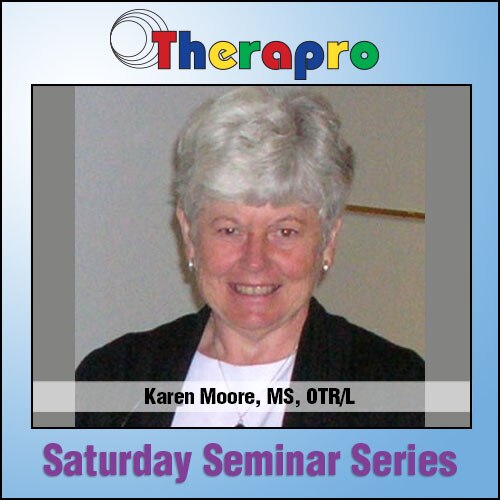
Jocelynn Wallach, MS, OTR/L‘s September 15th Saturday Seminar entitled: Practical and Effective Strategies to Improve Self-Regulation and Executive Function Skills, was a two hour presentation filled with useful and immediately applicable information. She shared valuable insights and information with the 51 captivated attendees!
With a wealth of over 40 years of pediatric experience in her distinguished career, Jocelynn provides innovative occupational therapy services for children in the Westwood, MA Public School System. In addition to her school-based practice, Jocelynn manages her private practice, Capable Hands and Associates. In addition, she has lectured nation-wide, taught college level courses, and provides training sessions and professional development courses for parents, therapists, instructional aides, and therapists in a variety of settings.
Jocelynn’s learning objectives for her seminar included reviewing the meaning of self-regulation and executive function skills based on the work of A. Jean Ayres, Lucy Jane Miller, Peg Dawson, and Richard Guare. Based on their body of work, she concludes that “self-regulation, which is the end result of well developed sensory integration and effective sensory processing, is the basis upon which higher level executive function skills can develop.”
Jocelynn provided an excellent review of neurological function to illuminate the relationship between self-regulation and executive function skills. She then proceeded to highlight the developmental stages of self-regulation and executive functioning from infancy through adolescence. She discussed “red flag” behaviors that might be observed when a sensory processing disorder and/or executive function dysfunction is present. The following website was recommended to help parents and school personnel have a better understanding of learning processes, insights into difficulties, and strategies for responding: Misunderstood Minds.
To make classrooms and home more conducive to learning, Jocelynn provided a number of useful recommendations with guidelines for calming and guidelines for alerting. She advocated for examining the child’s environment closely and the importance of trying out different environmental changes to determine their effectiveness. For example, simple seating adaptations can make a world of difference. Jocelynn shared her “Seating Options Data Collection” system to help determine what works and what does not work for a particular student.
Activities and apps for helping students improve executive function skills in areas of planning, organization, time management, task initiation, etc. were discussed. Several examples of useful apps she uses include: for self regulation – Pocket Pond, Fireworks, Pot Smash – Zen; for sustained attention – Monster Hunt, SIMON – I Say Pro, Eye Frenzy; and for planning – Voice Thread, Sticky Notes, Doodle Buddy. Some materials she suggested for therapeutic motor breaks include: Bungee Jumper, Thera-band activities, Rapper Snappers, Safety Grip Scooter Board, Drive Thru Menus, and How Does Your Engine Run?, to name just a few!
Jocelynn is a skilled and generous presenter who is very knowledgeable, as evidenced by a rapt and engaged audience. She has developed practical strategies, activities, and data collection methods to improve self-regulation and executive function skills that are designed to ensure student school success.
Attendees provided extremely positive feedback about Jocelynn’s seminar:
“Jocelynn is a great presenter and shared information that is relevant to our daily OT sessions, along with how to support teachers and provide strategies for class use!” – Amy H., Occupational Therapist
“A lot of tools, examples, and resources provided. Love the apps shown during the seminar!” – Vanessa C., Occupational Therapy Grad Student
“Very informative. Lots of suggestions. A review and a new way to look at things. Got my brain thinking. Good presentation.” – Anonymous, Teacher
“It was very comprehensive! Loved it!” – Patricia O., COTA
“Thank you so much for sharing! Just so fantastic. Wonderful, inspiring; gave me realistic ideas to hit the ground running. Thank you. So excited to share this with teachers & staff I work with!” – Tara G., Occupational Therapist
Thank you, Jocelynn!
Filomena Connor, MS, OTR/L
September 15, 2018


